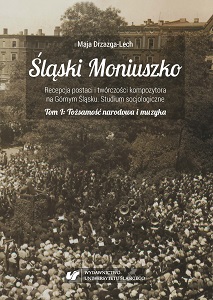Śląski Moniuszko. Tom I: Tożsamość narodowa i muzyka. Budowanie tożsamości narodowej poprzez muzykę Stanisława Moniuszki za życia kompozytora i w ramach działalności Związku Śląskich Kół Śpiewaczych w pierwszej połowie XX wieku
The Silesian Moniuszko. Vol I:The construction of nat. identity through the music of Stanisław Moniuszko during the composer’s lifetime and within the framework of the activities of the Association of Silesian Circles of Songsters
Author(s): Maja Drzazga-Lech
Subject(s): Social Sciences, Sociology, Nationalism Studies, Sociology of Culture, Identity of Collectives
Published by: Wydawnictwo Uniwersytetu Śląskiego
Keywords: the Polish national identity; the Silesian cultural identity; a cultural artefact; collective/social memory; a national/ethnic symbol
Summary/Abstract: The book constitutes the first of the two volumes of the publication entitled „The Silesian Moniuszko. The reception of the figure and the output of the composer in Upper Silesia. A sociological study”, based on research conducted by the author during the work on the dissertation entitled „The construction of national identity through music. The reception of the figure and the output of the composer in Upper Silesia in the 20th century. A sociological study”.
The construction of national identity through music is a long process whose bulk progresses in the intersubjective space of social life. The indicator of the occurrence of this process has to do with situations in which the execution and the reception of selected pieces of music, or the reception of the figures of the composers who consciously perform the role of activists engaged in the life of their national community, or to whom the creators of reception ascribe the performance of such a role is accompanied by a process of mythologisation of the given pieces of artistic work to the status of national symbols and that of the given composers to the status of national artists in music. This process is resented on the basis of the example of the reception of the figure and the output of Stanisław Moniuszko.
„Listy Stanisława Moniuszki” [„The Letters of Stanisław Moniuszko”] edited by Witold Rudziński and Magdalena Stokowska, were analysed from the perspective of humanist sociology. I focused on an analysis of press reports and the extant written statements of the composer (testimony of the reception of the works of Moniuszko), from which one may draw information about the context of the creation, execution and the presence of the works of Stanisław Moniuszko in the intersubjective cultural space peculiar to a given category of recipients. Moreover, an analysis was conducted upon the ways in which the Moniuszko narration, created by the Związek Śląskich Kół Śpiewaczych [the Association of Silesian Circles of Songsters] in the first half of the 20th century, was present in the Upper Silesian culture. One adopted the periodical “Śpiewak Śląski”/“Śpiewak” of the years 1920–1948 as the unit of analysis. For me, the Moniuszko narration, whose various variants were/continue to be present in the Upper Silesian intersubjective cultural space, constitute an element of social memory/cultural memory. As such, it is involved in the ethnic/national relations (conditioned by the socio-cultural and historical context) which obtain between the inhabitants of the Silesian land, especially between Polishness and Upper Silesianness.
Series: Nauki społeczne
- E-ISBN-13: 978-83-226-3438-7
- Print-ISBN-13: 978-83-226-3437-0
- Page Count: 182
- Publication Year: 2018
- Language: Polish
- eBook-PDF
- Sample-PDF
- Table of Content
- Introduction

